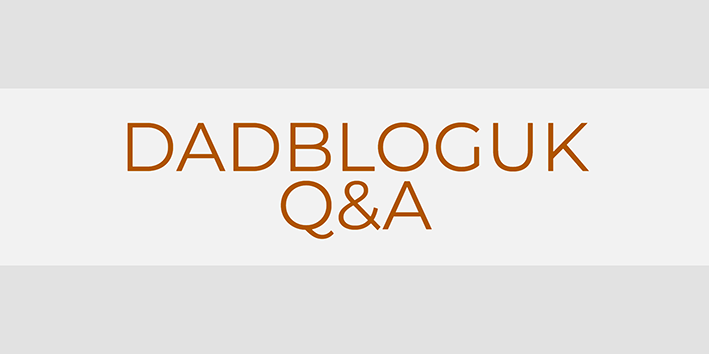Over the past few years I have noticed a major change in how men’s mental health is viewed. Men themselves are getting more open about the subject and there is increasing awareness that men’s mental health is particularly sensitive when they become fathers.

Noel McDermott is a licensed psychotherapist with, according to his website, 25 years’ experience working in health and social care. Noel, who regularly appears in the media discussing mental health and other related issues, is passionate about raising awareness of the challenges fathers face.
With Noel’s interest in fatherhood in mind, I was delighted when he agreed to participate in a Q&A for Dadbloguk. Among other things, I asked Noel a number of questions about the symptoms people should look out for in male relatives, how they can be supported if they have a partner with post-natal depression and if there are any particular issues that affect step fathers and adoptive dads. Here’s what Noel had to say.
What symptoms should relatives / friends look out for in a new dad that suggest he may have a mental health problem?
The signs of something maybe going wrong for new dads or dads to be are significant and can result in relatively quick changes in:
- Eating habits, appetite or weight (gain or loss)
- Sleeping habits changing or becoming disturbed
- Irritability, anger or concentration issues
- Increase in drinking or using drugs
- Becoming isolated and or withdrawn
All of these can suggest problems in mental health functioning, the sooner we spot the symptoms the sooner we get help the better. Dealing with any illness, mental or physical, at its early or acute stage vastly improves the chance of full recovery and reduces the possibility of relapse.

How common is it for men to experience mental health issues when they become new dads?
All men will have issues with becoming a new dad. If it doesn’t radically affect you then there is definitely something wrong! Those effects will be a mixture of fabulous and welcome and quite frankly lots of hard work. Absolutely no-none likes the lack of sleep. For one in ten men depression will occur during the pregnancy and one in four will experience post-partum depression, usually in the six to eight months after birth.
Men most at risk are those with a family history of mental health or addiction issues, those that experienced adverse childhood events or those who have had depression previously.
What about when mum has PND? What should we all do to support dad because that is going to be a very stressful time and dad may have little support.
In terms of helping its best to think of two approaches. One, prevention including screening, this is something we should all be doing. Two, diagnosis and treatment, for those that suspect or where others suspect there are problems.
Prevention falls into a couple of categories of education and lifestyle.
1. Learn about yourself and learn about common mental illnesses; the more you learn the better protected you are.
2. Make sure your lifestyle is mentally healthy (wealthy), a) talk to close friends and family about your feelings, b) have a good diverse social network, the more diverse the better, c) stay active and fit, d) practice good sleep hygiene.
This is your life scaffolding. The stuff that holds you up if you need repair!
Diagnosis and treatment is what it says on the tin. Go see a professional if you have worries, go as soon as the issues emerge; the sooner you get treatment the better. Treatment generally involves cognitive behaviour therapy, medication and lifestyle changes as described above.
If your partner seems ill to you, please repeat the steps described in diagnosis and treatment with her.
Furthermore, make sure you are getting extra support. Dealing with a new born and a post-natal depressed partner will wear you down to a collapse yourself. Even if you have no risk factors from your own past, do not underestimate the damage to yourself of being in this type of situation. You will not be able to cope with it on your own.
What challenges do new fathers face that lead to mental health problems?
Becoming a new dad involves a number of challenges. Firstly, there are dramatic hormonal and neurological changes that profoundly alter personality functioning. You’ll become more vulnerable, emotional, introspective etc. If all your mates are immature and afraid of these aspects of their functioning, you’ll feel fairly isolated pretty quickly. The fix is obvious, get to know other new dads.
The other big changes are becoming second or even further down the ranking to your partner as they obsess with the new born.
Your libido will change, you may find you don’t want sex as much. This is partly because you are so tired from the task of caring for an infant and supporting your partner.
Also, for some men the emotional response to their partner shifts. Libido can be influenced by lots of different things and seeing your partner more in a ‘mother’ role may make it difficult to see her as a sexual partner. There are cultural taboos about seeing ‘mother’ ‘father’ ‘brother’ ‘sister’ as sexual partners. So, if this is activated in you, it’s useful to acknowledge it and if necessary, get some help to reframe the view of your partner.
Also, the process of birth itself can be frightening and you may be left with anxiety about sex as a result, worried about putting your partner through that experience again.
It’s all normal, as is having a libido that kicks into high gear! The key is open communication about needs, wants and feelings.
What about step fathers or adoptive fathers? Any particular mental issues they face?
With step fathers there is always the question of legitimacy. Am I the real dad or not? And that question is more difficult the older the kids are that you join. That isn’t the issue here, it’s important to understand that being a dad is a role you play in a child’s life, it’s not the job title that comes with it. You need to behave with legitimate authority.
If you have the history of vulnerability to mental health already described and are becoming an adoptive or step dad, you are well advised to screen yourself and look at preventative work. All guys need to do this.
Do fathers who already have children also experience similar mental health issues?
Fathers who have additions to their existing families would still be well advised to think about their mental health resilience with each now addition, especially if there are vulnerabilities in their personal and family history.
We all need to be living a mentally wealthy lifestyle as a matter of course. Then we can mostly avoid major problems and any we do encounter are dealt with thoroughly and quickly.
What is your experience?
I hope you found Noel’s insight useful. If you have had to deal with any of the issues mentioned in this piece, I encourage you to leave a comment below. I think it’s important to discuss mental health and how it can affect dads, mums and wider family members.







1 thought on “Mental health and dads. Q&A with psychotherapist Noel McDermott”
Some of this resonated with me. I think however it’s worth mentioning birth trauma which is very common and when it happens it’s the mum that gets the focus that she needs of course, but often dad’s are not ‘seen’ as vulnerable and don’t know where to turn. This happened to me just over 5 years ago after the birth of my 2nd son who almost died due to illness and also medical neglect, so it was a complex trauma. I was highly anxious and disturbed as well as having to adapt to being a dad of two (our son survived thankfully) and supporting my wife. I didn’t know what to do initially and even though I considered myself open and savvy about mental health, it took a few months before I started counselling to address the trauma. It is a really important aspect of new dadhood for many and I would be happy to share my experiences further for the benefit of other dads that may be in similar situations.